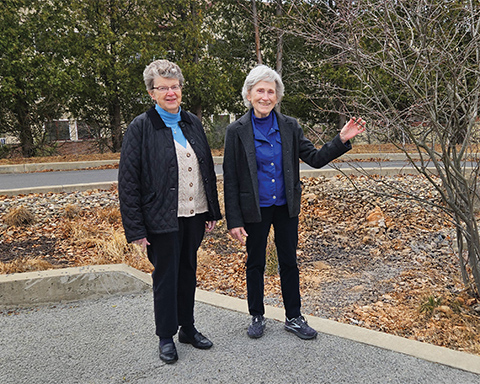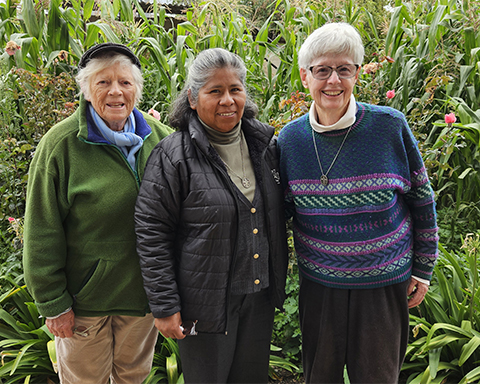Journey
Take a Long, Loving Look
Sisters Jean and Jean Louise explore a life element of simple living.
by Jean Louise Bachetti, IHM and Jean Coughlin, IHM
This article will take the format of a dialogue. Employing the practice of deep listening, we will respectfully build on each other’s thoughts and questions. In this way we hope to create a container for trust and honesty where new ideas can emerge as each of us attunes to the Spirit within and the wisdom of the other. An essential element of deep listening is contemplation. Since we are exploring a life element of simple living, we might consider this endeavor as a spiritual journey. Applying the spiritual practice of the acclaimed Trappist monk, Thomas Merton, the series, Bridges to Contemplative Living, notes that “Contemplative Living is a spiritual journey… a way of responding to our everyday experiences by consciously attending to our relationships. It deepens the awareness of our connectedness and communion with others, including nature, and becomes a positive force of change in our lives.” Therefore, as we, Jean and Jean Louise pursue the topic of simple living, we realize that we can approach it only in a contemplative manner, in other words, through an awareness, a consciousness of the “truly important issues of human existence.”

Jean: As I viewed the documentary, “Buy Now,” I was shocked at the sight of the growing mountains of waste from our throw-away society.
Jean Louise: In addition to the sight of these massive piles of waste, Jean, I felt a deep sense of grief. I guess, anger also, when I heard how corporations use algorithms in their advertising to create in us an urgency to “buy now while supplies last,” appealing to a need for the latest fashion, gadget, etc. From where does this desire grow in me? What generates this magnetic draw? I’m not even conscious of how it appeals to my ego’s compulsive nature.
Jean: Yes, the documentary! Those visuals prick my conscience. They shake me awake to what we are unconsciously doing to our planet, our own health. It was Chief Seattle who said, “Whatever we do to the web of life we do to ourselves.” There are consequences! In those mountains of waste are items I threw away. I am complicit in polluting. In her book, The Serviceberry, Robin Wall Kimmerer, a descendent of the Anishinaabe Tribe, asks, “What would it be like to consume with the full awareness that we are recipients of earthly gifts which we have not earned? To consume with humility? We are called to harvest honorably, with restraint, respect, reverence, and reciprocity.”
Pause/Reflect/Contemplate: How do Robin’s questions land in me?
Jean Louise: During that contemplative moment, I felt ashamed. I believe I love my home, this little blue dot in the vast universe. Taking that long, loving look at Mother Earth while at the same time treating her with disrespect with my garbage calls me to accountability. I can no longer be a mindless consumer. My recycling and composting are good, but not enough.
Jean: I know there are people who model this understanding of the interconnectedness of the web of life, real examples of living simply with a deep respect for the sacredness of God’s creation. Let me read to you what Robin writes about this sense of respect and gratitude. She says, “Enumerating the gifts you received creates a sense of abundance, the knowing that you already have what you need. Recognizing ‘enoughness’ is a radical act in an economy that is always urging us to consume more.” I’m wondering now, do I ever consider what IS enough? The Indigenous Peoples who inhabited this land before us were reflective, perhaps prayerful before killing a buffalo. They took a long, loving look at the buffalo and then asked forgiveness for taking its life because of their need for food and clothing. It might have been a form of ritual for an all-is-sacred kind of people who were grounded in their Great Spirit. What that buffalo had was enough for them at that moment.
Jean Louise: Hmm, I can stretch that somewhat when I consider how perceptive they were of life in all its forms. Thoughtfulness before killing the buffalo could be likened to the practice of contemplation. It reminds me of what Carmelite Sister Constance Fitzgerald defines as contemplation, “a love embrace of God’s Spirit in which transformation can create a new kind of earth community where I inhabit the earth in a truly human way.” She implies that in not caring for the earth and one another I am losing my humanity. Seemingly, then, by practicing this deep consciousness, I can become more attuned to how I can change my habit of heedless consumerism and consequent disregard for the care of our common home. It might even change the patterns in my brain to move from neediness to “enoughness.”
Pause. Reflect. Contemplate: What might I be willing to sacrifice today for future generations?
Jean: What you are saying calls me to respond from the core of my spiritual beliefs, beliefs that motivate me to create a culture of gratitude and respect by a mind/heart conversion. Perhaps the small acts of daily life suggested by Robin Wall Kimmerer can point me in the right direction when she says:
Give thanks for what you have been given.
Give a gift in reciprocity for what you have taken.
Sustain the ones who sustain you and the Earth will last forever.
“Going forward, we have to seek a mutually enhancing human-earth relationship.”
—Thomas Berry
Sister Jean Louise serves as an Assistant for the LCWR Initiative.
Sister Jean serves as a volunteer at Our Lady of Peace Residence and at Friends of the Poor’s Jackson Terrace Food Pantry
Resources:
Bridges to Contemplative Living with Thomas Merton, vol. 2, edited by Jonathan Montaldo & Robert G. Toth, Ave Maria Press, 2006.
The Desire for God and the Transformative Power of Contemplation, Constance Fitzgerald, OCD, Desire, Darkness, and Hope, Theology in a Time of Impasse, ed. by Laurie Cassidy and M. Shawn Copeland, 2021, Liturgical Press Academic
The Serviceberry: Abundance and Reciprocity in the Natural World, Robin Wall Kimmerer, Schribner, 2024



